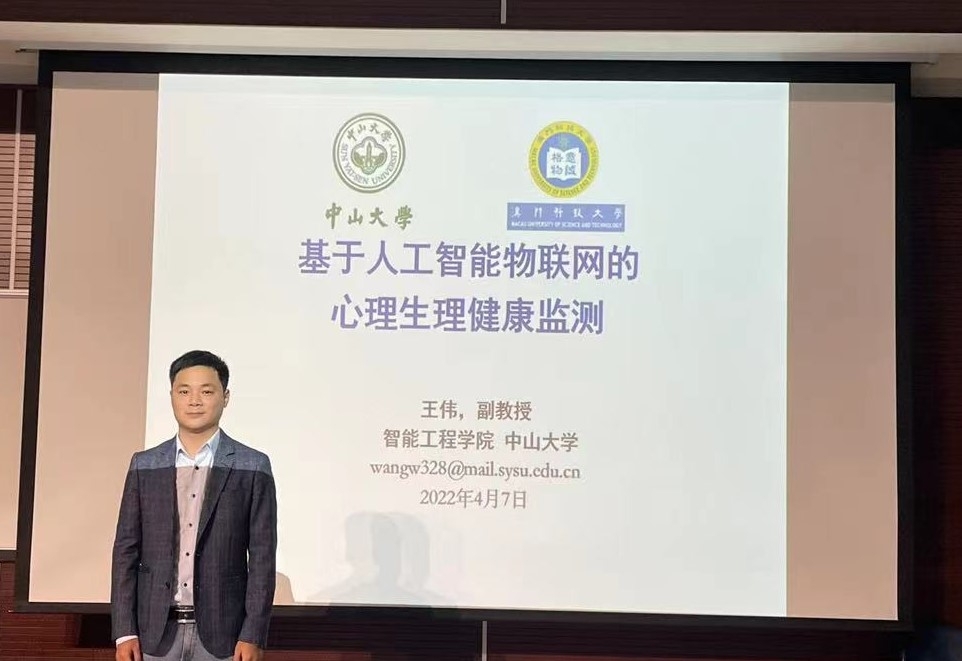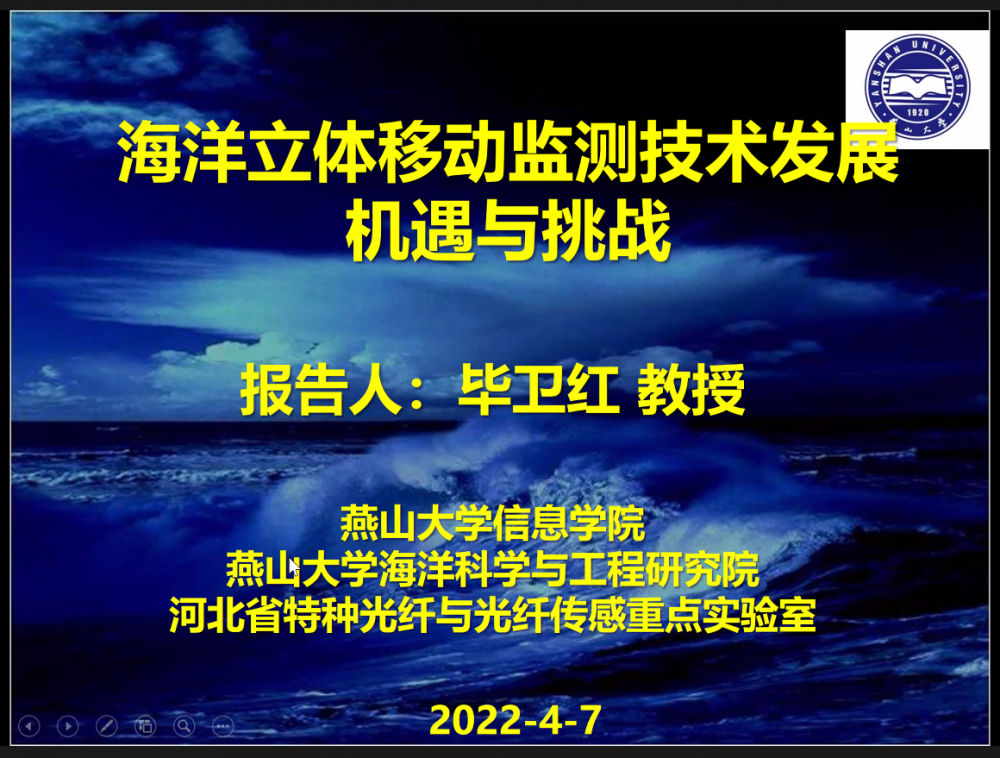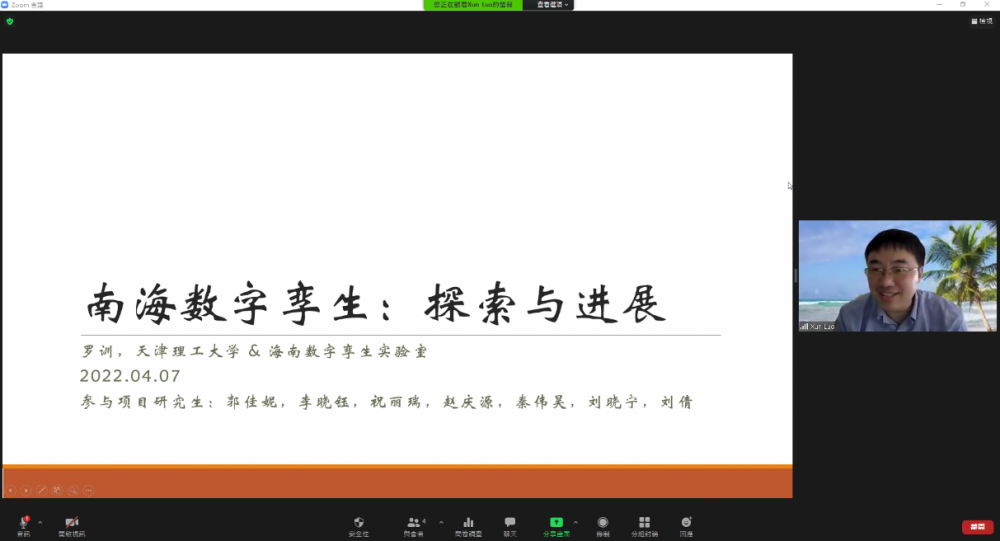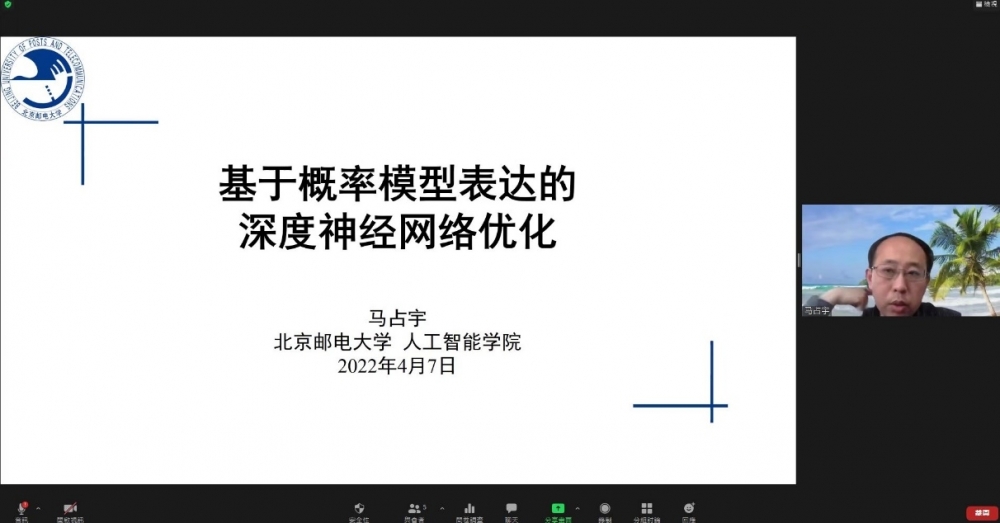To celebrate the 22nd anniversary of the establishment of Macau University of Science and Technology (MUST), the School of Computer Science and Engineering (SCSE) held an academic seminar in Lecture Hall N211, Block N on April 7, 2022. To comply with the guidelines and requirements for epidemic prevention, the seminar was conducted simultaneously in an online and on-site way. The Seminar specially invited Associate Professor Wang Wei from School of Intelligent Systems Engineering, Sun Yat-sen University, Professor Bi Weihong, Director of Institute of Marine Science and Engineering, Yanshan University, Professor Luo Xun, Director of Hainan Digital Twins and Smart Interconnect Innovation Laboratory, and Professor Ma Zhanyu from School of Artificial Intelligence, Beijing University of Posts and Telecommunications. More than 70 students and faculty members from the School of Computer Science and Engineering attended the celebration event.
Associate Professor Wang Wei gave the speech entitled " Integration of AI and IoT for Psychophysiological Health Condition Monitoring". With the rapid development of artificial intelligence and Internet of Things technologies, we can acquire and process massive amounts of data, which in turn can help us improve our health monitoring capabilities. This health monitoring includes not only physical health but also mental health. Psychophysiological health monitoring concerns everyone, especially in the 21st century when the pace of life is fast, and people are under great pressure. In this speech, he shared some of their research progress in psychophysiological health monitoring based on AI and IoT technology. The goal is to provide accurate health monitoring and identification services based on a non-disruptive mode.
Prof. Bi Weihong gave the speech entitled "Opportunities and Challenges in the Development of Marine Multi-dimensional Mobile Monitoring". In her speech, she introduced the latest research results achieved by her team in the process of completing the Ministry of Science and Technology's key R&D projects "Research and development of seawater total organic carbon optical in-situ sensor and online monitor instrument” (2017YFC1403800) and "Research on the causes of ecological disasters, and monitoring and early warning system in Qinhuangdao sea area (2019YFC1407900)", the focuses are TOC optical in-situ sensor with high accuracy and low power consumption, optical imaging-based jellyfish number and type monitoring technology, three-dimensional fluorescence-based toxic red tide algae concentration monitoring technology, high optical spectrometer-based marine green tide monitoring technology, sea drone landing and charging technology, and multi-dimensional mobile monitoring system.
Prof. Luo Xun gave the speech entitled "Digital twins in the South China Sea - exploration and progress". Seventy percent of the Earth's surface is ocean. Compared with the vastness of the oceans, human understanding of them is still very limited. Traditional deep-sea research relies on divers or robots to conduct research, which has significant limitations in terms of spatial breadth and time granularity. In Hainan, they integrated marine research and information technology, and used digital twin methods to digitally model and parametrically simulate fish, coral reefs, and mangroves in the South China Sea, achieving good results. The research results have been applied in the South China Sea Museum of China (Hainan) and have been promoted internationally in collaboration with scientists in Latin America.
Professor Ma Zhanyu gave the talk on "Deep Neural Network Optimization Based on Probabilistic Model Representation". As an important component of deep learning, deep neural networks have problems such as overly complex structures, unclear functional mechanisms such as attention and incomplete observation data, and their optimization methods are facing challenges. His team focuses on the optimization methods of deep neural networks based on probabilistic model expressions. To address the problems of systematic bias introduced by Dropout regularization based on traditional distribution, weak interpretability of traditional attention mechanism, and insufficient generalization ability due to incomplete observation data,they proposed a deep neural network regularization framework based on non-Gaussian prior, a deep neural network attention mechanism based on non-Gaussian prior, and a hybrid model-based output feature uncertainty estimation method, which effectively reduce the complexity of the network, better explain the attention mechanism of the model, and improve the reliability of the prediction results.

Associate Professor Wang Wei was giving the speech

Professor Bi Weihong was giving the speech

Professor Luo Xun was giving the speech

Professor Ma Zhanyu was giving the speech
